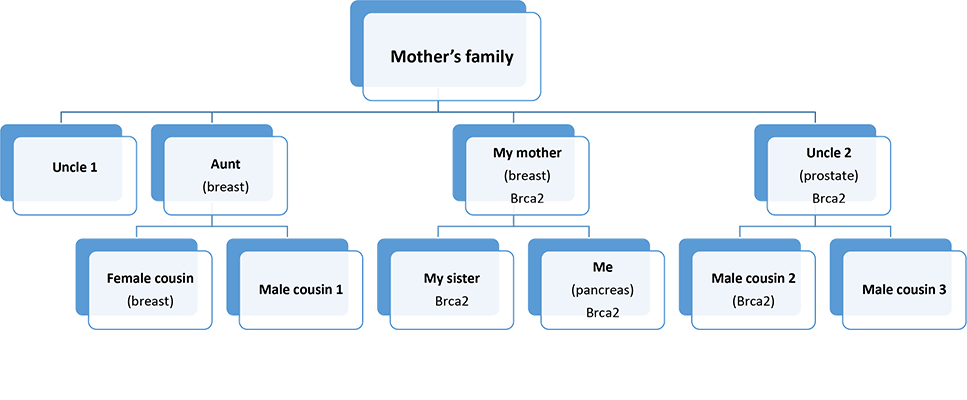Family Ties and Mutating Genes
For some time, my sister, who lost her husband to a lung tumour, had been looking into the high incidence of tumours in my mother’s family, and she realised it was no accident. Here is the family tree:

So my sister asked my mother to have herself tested for the Brca1 or Brca2 germline mutation. Since Angelina Jolie made her mutation public, and chose to undergo a preventive mastectomy, there’s been a lot more discussion on the subject. The debate has become less heated, the reactions less simplistic.
This all took place around the start of 2017, or maybe slightly earlier. Given the frequency of breast tumours in our family, we already made sure to do yearly ultrasound and mammography exams. My mother is strict when it comes to prevention. But I told the rest of the family that I didn’t want to know about mother’s test results. I didn’t want to live with that sword of Damocles over my head. I was doing the check-ups, that was enough for me.
But I found out right away that my mother was positive for Brca2, because, being the one who opened her e-mails and printed out the attachments, what was I going to do, not take a look? At which point my sister began telling me that I’d better pay close attention to my ovaries, where tumours are less frequent, but more deadly. And I did what I was told.
Only no one warned us that carriers of the Brca2 germline mutation are also at risk for other tumours that prove less frequent than those of the breast, the ovaries and the prostate, but they occur at a higher than average rate.
Right from the start of this story, I’ve learned any number of things. The most important is that there’s nothing to gain by hiding your head in the sand. The clouds won’t go away just because you shut your eyes. You might as well know how things stand. And when it comes to preventing or treating a tumour, knowing whether you’re a carrier of a germline mutation is extremely important.
My sister decided to have preventive surgery done. Her ovaries have already been taken out, and in a few months, she’ll have a bilateral mastectomy (the pancreas is something she has to keep). She lives in Belgium, where awareness and practice of these preventive measures seems to be much more common. She decided that it wasn’t worth running the risk of a tumour, together with the chemotherapy and all the related complications: not with such a high level of risk.
I drew the joker in all this. But as I see it, my situation has motivated the rest of the family to control theirs even sooner. We’ll have our children checked too, though they won’t necessarily have inherited the mutation. All you have to do is have a blood sample taken. I’m not sure exactly how much it costs, but if there is a high incidence in your family, you can go to a geneticist and have the exam prescribed, meaning that, under the Italian healthcare system, you only pay the minimum charge. Otherwise, from what I see on the internet, if you have the test done at a private facility, it costs roughly 200 euro (I’ll change the figure as soon as I get more precise information).
I recently came across a Facebook group for “mutants”. It’s a closed group, so that I won’t name it, but it’s affiliated with the non-profit association aBRCAdaBRA Onlus, which works to spread information, bring people together, provide advice, change the general outlook on the subject and obtain improvements in legislation. The Facebook group is attended and run by women with mutations, some of whom already have tumours or are at high risk of getting one, including a number of very young women. But still, the atmosphere is anything but sad, scary or depressing. On the contrary, spirits are always high, marked by a great willingness to help, to talk things over and to provide support.
I’ve even discovered, over the last few months, that if you have to have a tumour of the pancreas, then being a carrier of the Brca2 mutation turns out to be an advantage. I don’t know what triggered my tumour, and no one will ever be able to say for sure, but it’s probably due to a combination of factors: years of smoking cigarettes, a sedentary lifestyle, being overweight, not always eating right, the germline mutation. But for carriers of the mutation, research on the pancreas (I don’t know about the other types of tumours) is starting to produce results. We represent less than 10% of all tumour patients, but progress is being made.